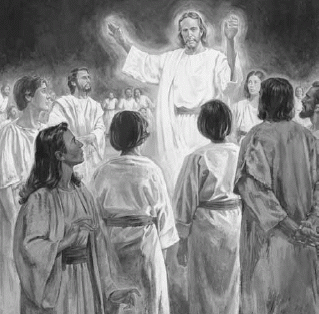Question
Gramps,
Ecclesiastes 9:10King James Version (KJV)
10 Whatsoever thy hand findeth to do, do it with thy might; for there is no work, nor device, nor knowledge, nor wisdom, in the grave, whither thou goest.
According to this verse in the Bible, there is no work, etc in the grave. How do Mormons explain that one can still learn or that when baptisms for the dead are done, they can choose from the grave? I’m very confused about this. Thanks!
David
Answer
Dear David,
Death is the separation of the spirit from the body. When a person dies, their body is laid in the earth and the spirit goes to the world of spirits, either to a paradise or prison, based on the decisions they’ve made in this life. The Book of Mormon prophet Jacob explains the state of death and how Christ’s Atonement overcomes it. Note the 3 locations: the grave (for the body), paradise (for the righteous spirits), and hell (for the wicked spirits). Note also how the Atonement grants deliverance from each.
“O how great the goodness of our God, who prepareth a way for our escape from the grasp of this awful monster; yea, that monster, death and hell, which I call the death of the body, and also the death of the spirit. And because of the way of deliverance of our God, the Holy One of Israel, this death, of which I have spoken, which is the temporal, shall deliver up its dead; which death is the grave. And this death of which I have spoken, which is the spiritual death, shall deliver up its dead; which spiritual death is hell; wherefore, death and hell must deliver up their dead, and hell must deliver up its captive spirits, and the grave must deliver up its captive bodies, and the bodies and the spirits of men will be restored one to the other; and it is by the power of the resurrection of the Holy One of Israel. O how great the plan of our God! For on the other hand, the paradise of God must deliver up the spirits of the righteous, and the grave deliver up the body of the righteous; and the spirit and the body is restored to itself again, and all men become incorruptible, and immortal, and they are living souls, having a perfect knowledge like unto us in the flesh, save it be that our knowledge shall be perfect.” (2 Nephi 9:10-13)
From this, we see that for Jacob, the grave: is death; is the death of the body; is temporal (relating to this life, relating to time); shall deliver up its dead; must deliver up its dead; must deliver up its captive bodies; will deliver up the body of the righteous.
We also see that for Jacob, hell: is the death of the spirit; is spiritual death; shall deliver up its dead; must deliver up its dead; must deliver up its captive spirits.
And not to leave things undone, for Jacob, paradise: must deliver up the spirits of the righteous.
That is the state of the dead, with their dead bodies in the grave and their dead spirits either in paradise or hell. Then comes Christ with His Atonement which provides: a way for our escape from the grasp of this awful monster; the way of deliverance of our God; that the bodies and the spirits of men will be restored one to the other; the power of the resurrection of the Holy One of Israel; that the spirit and the body is restored to itself again, and all men become incorruptible, and immortal, and they are living souls, having a perfect knowledge like unto us in the flesh. In this resurrected state, they are prepared to be judged.
The preacher of Ecclesiastes recognized this distinction of the realm of dead spirits and the realm of the dead body. At death “the dust [(or body) shall] return to the earth as it was: and the spirit shall return unto God who gave it.” (Eccles. 12:7). Knowing this, the preacher focused on half the deathly destination: “in the grave” where the body rots, “there is no work, nor device, nor knowledge, nor wisdom.” Knowledge and wisdom are to be found in the spirit, not the body! But Jacob speaks of two separate destinations for the righteous and wicked spirits, so how are those in hell supposed to learn knowledge and light to cross into paradise?
Although Joseph Smith revealed the practice of baptism for the dead, it was Joseph F. Smith (his nephew) who later shared his vision of the spirit world. He pondered on the teachings of Peter in the New Testament:
“For Christ also hath once suffered for sins, the just for the unjust, that he might bring us to God, being put to death in the flesh, but quickened by the Spirit: By which also he went and preached unto the spirits in prison; Which sometime were disobedient, when once the longsuffering of God waited in the days of Noah, while the ark was a preparing, wherein few, that is, eight souls were saved by water.” (1 Peter 3:18-20)
“For for this cause was the gospel preached also to them that are dead, that they might be judged according to men in the flesh, but live according to God in the spirit.” (1 Peter 4:6)
Mark it well, David. Jesus “went and preached unto the spirits in prison!” Jesus’ spirit worked, and the spirits were given knowledge! Joseph F. Smith’s revelation (you may read it here) shares a remarkable vision of how Jesus spent His time in the world of spirits and the condition of the righteous in paradise and the wicked in hell. It also shares how the wicked are delivered from hell: “The dead [in hell] who repent will be redeemed [in paradise], through obedience to the ordinances of the house of God.” (D&C 138:58). That is, they are taught and must receive the principles and ordinances of the gospel “faith in God, repentance from sin, vicarious baptism for the remission of sins, [and] the gift of the Holy Ghost by the laying on of hands.” (D&C 138:33). Note here that none of this could be done until Jesus arrived and organized the spirits in paradise. Little wonder then, that BC Ecclesiastes urges us to “fear God, and keep his commandments: for this is the whole duty of man.” (12:13).
Finally, although the spirits of the dead can continue in some works (such as repentance and preaching), other works require a body and cannot be performed in the spirit world. This is where vicarious ordinances (such as baptism for the dead) comes in. The sealing power that binds on heaven as on earth (see Matthew 16:17-19) makes it so that repentant spirits can “be judged according to men in the flesh” – as though they had received the baptism in the flesh – “but live according to God in the spirit.”
Gramps






